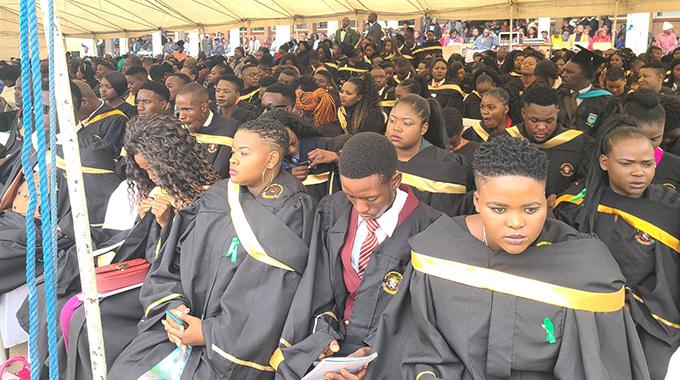News / National
515 students graduate at Joshua Mqabuko Nkomo Polytechnic
17 Oct 2024 at 07:55hrs |
0 Views

A total of 515 students graduated yesterday from Joshua Mqabuko Nkomo Polytechnic in Gwanda, Matabeleland South, marking a significant milestone in the institution's efforts to contribute to Zimbabwe's education and development goals. Of the graduates, 356 were from the Teacher Education Division, while 159 completed studies in the Technical Division.
The ceremony was officiated by Deputy Minister of Higher and Tertiary Education, Innovation, Science and Technology Development, Simelisizwe Sibanda, who stood in for Minister Dr Fredrick Shava. In his address, read by Deputy Minister Sibanda, Dr Shava extended his congratulations to the graduates and highlighted the Government's commitment to supporting their entrepreneurial pursuits.
Dr Shava emphasized the importance of creating new businesses that not only benefit the individual but also contribute to the development of the country as part of Zimbabwe's Vision 2030. "Our National Vision is to transform Zimbabwe into an upper middle-income economy by 2030 through innovation and industrialisation. Teacher education colleges and our polytechnics play a pivotal role in informing the achievement of this goal," he said.
He noted that the Government is providing financial and legal support to graduates who aim to become entrepreneurs, enabling them to create job opportunities for themselves and others, thereby contributing to national prosperity. He lauded the graduation theme, "Skills development: A catalyst for a prosperous and empowered upper middle-income society by 2030," as it aligns with Heritage-Based Education 5.0, which is revolutionizing Zimbabwe's education sector.
The Heritage-Based Education 5.0 model, central to the Government's educational reforms, focuses on producing graduates with the knowledge and skills needed for innovation and industrialization. Dr Shava also touched on the importance of the Secondary Science School Teachers programme, initiated by President Mnangagwa, which aims to address the skills gap in science education following the 2018 National Skills Audit.
Joshua Mqabuko Nkomo Polytechnic is one of four colleges selected to train both primary school teachers and secondary school science and mathematics teachers, helping to bridge the gap in natural sciences education.
Polytechnic Principal Dr Ngoni Moyo highlighted the institution's commitment to transforming the curriculum in line with the Heritage-Based Education 5.0 philosophy. Since its establishment in 1981, the Teacher Education Division has produced 16,918 graduates, while 3,850 students have graduated from the Technical Division since 2004.
Dr Moyo reiterated that the institution's programs are guided by Zimbabwe's economic blueprint, the National Development Strategy 1 (NDS1), which emphasizes empowering students through transformative science and technology education to contribute to national development.
Matabeleland South Provincial Affairs and Devolution Minister, Dr Evelyn Ndlovu, also spoke at the ceremony, calling on stakeholders in the province to play an active role in promoting human capital development. She expressed her commitment to the Ministry's Heritage-Based Education 5.0 philosophy and noted that the province has many opportunities to contribute to Vision 2030 through initiatives such as the Integrated Skills Outreach Programme (ISEOP).
The ceremony celebrated not only the achievements of the graduates but also the ongoing efforts by the Polytechnic and the province to foster skills development and innovation for a prosperous Zimbabwe.
The ceremony was officiated by Deputy Minister of Higher and Tertiary Education, Innovation, Science and Technology Development, Simelisizwe Sibanda, who stood in for Minister Dr Fredrick Shava. In his address, read by Deputy Minister Sibanda, Dr Shava extended his congratulations to the graduates and highlighted the Government's commitment to supporting their entrepreneurial pursuits.
Dr Shava emphasized the importance of creating new businesses that not only benefit the individual but also contribute to the development of the country as part of Zimbabwe's Vision 2030. "Our National Vision is to transform Zimbabwe into an upper middle-income economy by 2030 through innovation and industrialisation. Teacher education colleges and our polytechnics play a pivotal role in informing the achievement of this goal," he said.
He noted that the Government is providing financial and legal support to graduates who aim to become entrepreneurs, enabling them to create job opportunities for themselves and others, thereby contributing to national prosperity. He lauded the graduation theme, "Skills development: A catalyst for a prosperous and empowered upper middle-income society by 2030," as it aligns with Heritage-Based Education 5.0, which is revolutionizing Zimbabwe's education sector.
The Heritage-Based Education 5.0 model, central to the Government's educational reforms, focuses on producing graduates with the knowledge and skills needed for innovation and industrialization. Dr Shava also touched on the importance of the Secondary Science School Teachers programme, initiated by President Mnangagwa, which aims to address the skills gap in science education following the 2018 National Skills Audit.
Joshua Mqabuko Nkomo Polytechnic is one of four colleges selected to train both primary school teachers and secondary school science and mathematics teachers, helping to bridge the gap in natural sciences education.
Polytechnic Principal Dr Ngoni Moyo highlighted the institution's commitment to transforming the curriculum in line with the Heritage-Based Education 5.0 philosophy. Since its establishment in 1981, the Teacher Education Division has produced 16,918 graduates, while 3,850 students have graduated from the Technical Division since 2004.
Dr Moyo reiterated that the institution's programs are guided by Zimbabwe's economic blueprint, the National Development Strategy 1 (NDS1), which emphasizes empowering students through transformative science and technology education to contribute to national development.
Matabeleland South Provincial Affairs and Devolution Minister, Dr Evelyn Ndlovu, also spoke at the ceremony, calling on stakeholders in the province to play an active role in promoting human capital development. She expressed her commitment to the Ministry's Heritage-Based Education 5.0 philosophy and noted that the province has many opportunities to contribute to Vision 2030 through initiatives such as the Integrated Skills Outreach Programme (ISEOP).
The ceremony celebrated not only the achievements of the graduates but also the ongoing efforts by the Polytechnic and the province to foster skills development and innovation for a prosperous Zimbabwe.
Source - The Chronicle
Join the discussion
Loading comments…

























